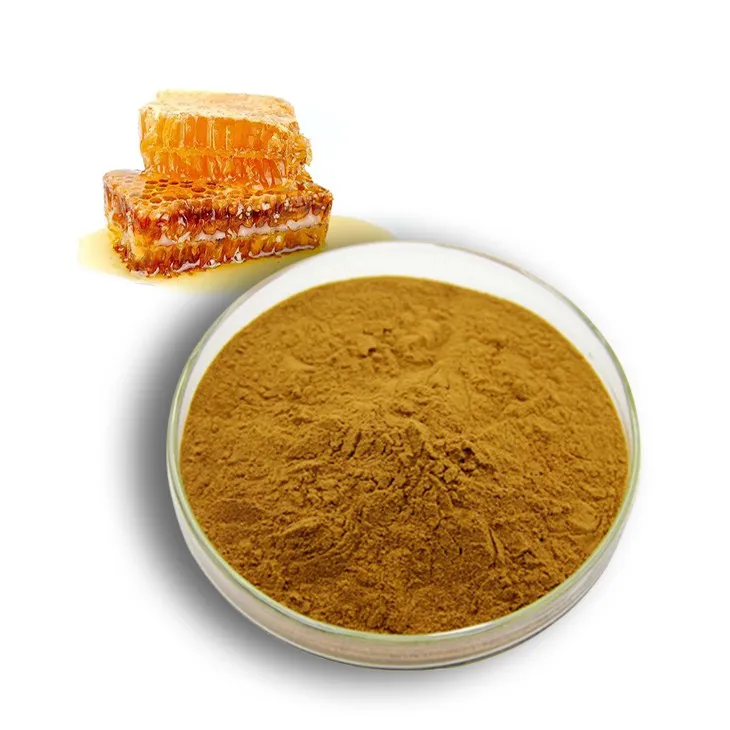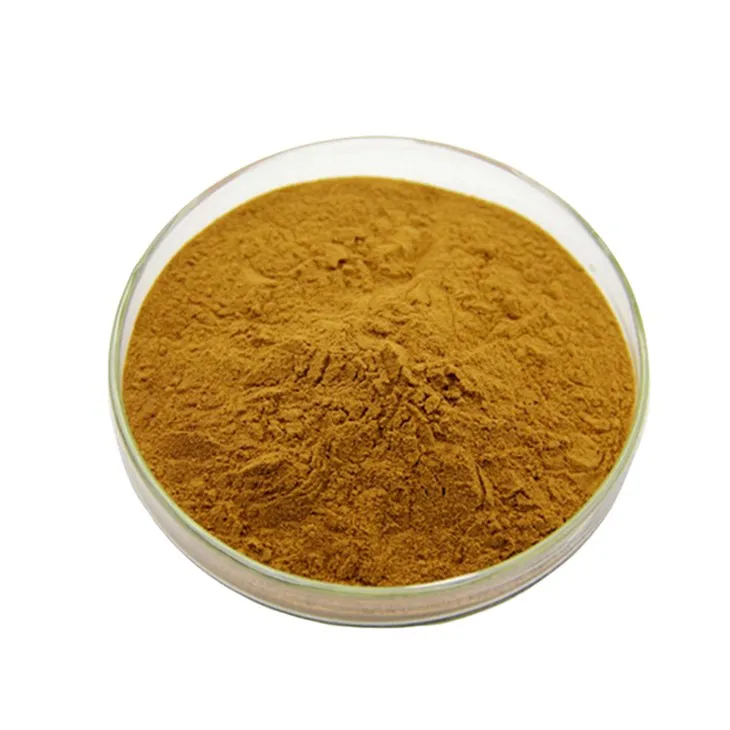- 0086-571-85302990
- sales@greenskybio.com
Is propolis extract powder beneficial for diabetes? Are these all safe and suitable for diabetic patients?
2024-11-13

1. Introduction
Diabetes mellitus is a chronic metabolic disorder that affects millions of people worldwide. Management of blood sugar levels is crucial for diabetic patients to prevent complications. In recent years, there has been growing interest in natural products like Propolis Extract Powder for their potential health benefits, including possible effects on diabetes. Propolis is a resinous substance that bees collect from various plant sources and use in the construction and protection of their hives. Propolis Extract Powder is a concentrated form of propolis that contains a variety of bioactive compounds. This article aims to explore whether Propolis Extract Powder is beneficial for diabetes and whether it is safe for diabetic patients.

2. Components of Propolis Extract Powder
Propolis extract powder contains a rich array of components, many of which may have implications for diabetes management.
2.1 Flavonoids
Flavonoids are one of the major groups of compounds in propolis. These natural substances have antioxidant, anti - inflammatory, and potential hypoglycemic properties. Some flavonoids may help improve insulin sensitivity, which is crucial for diabetic patients. For example, Quercetin, a common flavonoid in propolis, has been shown in some studies to enhance the action of insulin in cells. This means that it can potentially help cells respond better to insulin, allowing for more efficient uptake of glucose from the bloodstream. Another flavonoid, kaempferol, may also play a role in modulating glucose metabolism. It could influence enzymes involved in glucose production and utilization in the body.
2.2 Phenolic Acids
Phenolic acids are also present in propolis extract powder. These compounds may contribute to the overall antioxidant capacity of propolis. While their direct effect on diabetes is not as well - studied as flavonoids, their antioxidant properties may indirectly benefit diabetic patients. Oxidative stress is increased in diabetes, and phenolic acids can help combat this by neutralizing free radicals. By reducing oxidative stress, phenolic acids may potentially help protect pancreatic beta - cells, which are responsible for insulin production. If these cells are protected, it could lead to better insulin secretion and thus better blood sugar control.

3. Potential Benefits of Propolis Extract Powder for Diabetes
There are several potential ways in which propolis extract powder could be beneficial for diabetic patients.
3.1 Blood Sugar Regulation
As mentioned earlier, the flavonoids in propolis may improve insulin sensitivity. This can lead to better regulation of blood sugar levels. In some animal studies, propolis supplementation has been shown to reduce fasting blood glucose levels. The mechanism may involve activation of certain intracellular signaling pathways that are involved in glucose uptake and metabolism. Additionally, propolis may also affect the release of glucose from the liver. By inhibiting excessive glucose production in the liver, it can help keep blood sugar levels within a normal range. However, it should be noted that human studies are still relatively limited, and more research is needed to confirm these effects in diabetic patients.
3.2 Anti - Inflammatory Effects
Diabetes is associated with chronic inflammation. Propolis has well - known anti - inflammatory properties. The anti - inflammatory compounds in propolis can help reduce the systemic inflammation seen in diabetes. This is important because chronic inflammation can interfere with insulin signaling and contribute to insulin resistance. By reducing inflammation, propolis may potentially improve insulin function and help in the management of blood sugar levels. For example, some components of propolis can inhibit the production of pro - inflammatory cytokines such as interleukin - 6 and tumor necrosis factor - alpha, which are often elevated in diabetic patients.
3.3 Protection of Pancreatic Beta - Cells
The antioxidant and anti - inflammatory properties of propolis extract powder may also protect pancreatic beta - cells. These cells are constantly under stress in diabetic patients due to factors such as high blood sugar levels and oxidative stress. Propolis can help reduce this stress and potentially prevent the destruction or dysfunction of beta - cells. If beta - cells are protected, they can continue to produce insulin effectively, which is essential for blood sugar control. Some in - vitro studies have shown that propolis can protect beta - cells from damage caused by toxins or high glucose concentrations.

4. Safety Considerations for Diabetic Patients
While propolis extract powder may have potential benefits for diabetes, safety is also a crucial aspect, especially considering the unique situation of diabetic patients.
4.1 Allergic Reactions
Propolis can cause allergic reactions in some individuals. Allergic reactions to propolis can range from mild symptoms such as skin rashes and itching to more severe reactions like difficulty breathing and anaphylactic shock. Diabetic patients who are considering using propolis extract powder should be aware of this risk. Those with a known allergy to bee products or a history of allergies should be especially cautious. Before starting propolis supplementation, it may be advisable to do a patch test to check for potential allergic reactions.
4.2 Interactions with Medications
Diabetic patients often take medications to control their blood sugar levels. Propolis extract powder may interact with these medications. For example, if propolis has a hypoglycemic effect, it could potentially enhance the effect of anti - diabetic medications. This may lead to an excessive drop in blood sugar levels, which can be dangerous. On the other hand, some components of propolis may interfere with the absorption or metabolism of medications. It is essential for diabetic patients to consult their healthcare provider before using propolis extract powder if they are taking medications. The healthcare provider can assess the potential for interactions and determine whether it is safe for the patient to use propolis.
4.3 Individual Variability
Each diabetic patient is unique, and there may be significant individual variability in how they respond to propolis extract powder. Factors such as age, overall health status, and the severity of diabetes can influence the response. Some patients may experience significant benefits, while others may not show any improvement or may even experience adverse effects. Therefore, it is important to monitor the patient's response closely when starting propolis supplementation. This can include regular blood sugar monitoring, as well as observing for any signs of adverse effects such as allergic reactions or changes in blood pressure.

5. Current Research and Future Directions
Research on the use of propolis extract powder for diabetes is still in its early stages, and there are many areas that need further exploration.
5.1 More Clinical Trials
Most of the current evidence comes from animal studies or small - scale human studies. There is a need for large - scale, well - designed clinical trials to confirm the potential benefits of propolis extract powder for diabetes. These trials should include a diverse group of diabetic patients, with different types of diabetes (such as type 1 and type 2 diabetes) and various degrees of disease severity. They should also have long - term follow - up to assess the safety and effectiveness of propolis supplementation over time.
5.2 Mechanism Studies
While some possible mechanisms for the effects of propolis on diabetes have been proposed, such as through flavonoids improving insulin sensitivity, more in - depth mechanism studies are required. Understanding the exact molecular and cellular mechanisms can help in the development of more targeted and effective therapies. For example, research could focus on how propolis components interact with specific receptors or enzymes involved in glucose metabolism and insulin signaling.
5.3 Standardization of Propolis Extract Powder
Currently, there is a lack of standardization in the production of propolis extract powder. Different products may vary in their composition and potency. Standardization is crucial for ensuring consistent quality and reliable results in research and in the use of propolis for diabetes treatment. This includes standardizing the extraction methods, as well as establishing quality control measures for the identification and quantification of key components in propolis extract powder.
6. Conclusion
Propolis extract powder contains components such as flavonoids and phenolic acids that may have potential benefits for diabetes, including blood sugar regulation, anti - inflammatory effects, and protection of pancreatic beta - cells. However, safety considerations are important, especially regarding allergic reactions, interactions with medications, and individual variability. Current research on the use of propolis for diabetes is limited, and more clinical trials, mechanism studies, and standardization of propolis extract powder are needed. Diabetic patients who are interested in using propolis extract powder should consult their healthcare provider first to ensure its safety and suitability for their individual situation.
FAQ:
What are the main components in propolis extract powder that might be beneficial for diabetes?
Propolis extract powder contains flavonoids, which are among the components that may potentially aid in diabetes management. Flavonoids have antioxidant properties and may play a role in improving insulin sensitivity and blood sugar control. However, more research is needed to fully understand the mechanisms.
Can propolis extract powder replace diabetes medications?
No, propolis extract powder cannot replace diabetes medications. While it may have some beneficial effects on blood sugar control, it is not a substitute for the medications prescribed by a doctor. Diabetes medications are specifically designed to regulate blood sugar levels, and any changes to the treatment plan should be made under medical supervision.
Are there any side effects of propolis extract powder for diabetic patients?
Some diabetic patients may experience side effects from propolis extract powder. Allergic reactions are possible, such as skin rashes, itching, or swelling. Additionally, it may interact with other medications, so it is important to consult a doctor before starting to take it. Each person's body reacts differently, and individual sensitivities need to be considered.
How should diabetic patients take propolis extract powder?
If a diabetic patient decides to take propolis extract powder, they should follow the recommended dosage instructions on the product label. It is also advisable to consult a healthcare provider first, especially if they are taking other medications or have other health conditions. Starting with a small dose and gradually increasing it while monitoring for any adverse effects can be a cautious approach.
Is propolis extract powder equally beneficial for all types of diabetes?
There is currently no evidence to suggest that propolis extract powder is equally beneficial for all types of diabetes. Different types of diabetes (e.g., type 1, type 2, gestational diabetes) have different underlying causes and pathophysiologies. While it may show potential in some aspects of blood sugar control, more research is required to determine its effectiveness across all diabetes types.
Related literature
- The Effects of Propolis on Diabetes Mellitus: A Review of the Current Evidence"
- "Propolis and Blood Sugar Regulation: Recent Research Findings"
- "Safety and Efficacy of Propolis in Diabetic Patients: A Meta - analysis"
- ▶ Hesperidin
- ▶ Citrus Bioflavonoids
- ▶ Plant Extract
- ▶ lycopene
- ▶ Diosmin
- ▶ Grape seed extract
- ▶ Sea buckthorn Juice Powder
- ▶ Fruit Juice Powder
- ▶ Hops Extract
- ▶ Artichoke Extract
- ▶ Mushroom extract
- ▶ Astaxanthin
- ▶ Green Tea Extract
- ▶ Curcumin
- ▶ Horse Chestnut Extract
- ▶ Other Product
- ▶ Boswellia Serrata Extract
- ▶ Resveratrol
- ▶ Marigold Extract
- ▶ Grape Leaf Extract
- ▶ New Product
- ▶ Aminolevulinic acid
- ▶ Cranberry Extract
- ▶ Red Yeast Rice
- ▶ Red Wine Extract
-
Rosemary extract
2024-11-13
-
Pueraria Lobata Extract
2024-11-13
-
Alisma Extract
2024-11-13
-
Apricot Powder
2024-11-13
-
Nettle Root Extract
2024-11-13
-
Pine bark Extract Powder
2024-11-13
-
Artichoke Extract
2024-11-13
-
Horse Chestnut Extract
2024-11-13
-
Tongkat Ali Extract Powder
2024-11-13
-
Giant Knotweed Extract
2024-11-13





















